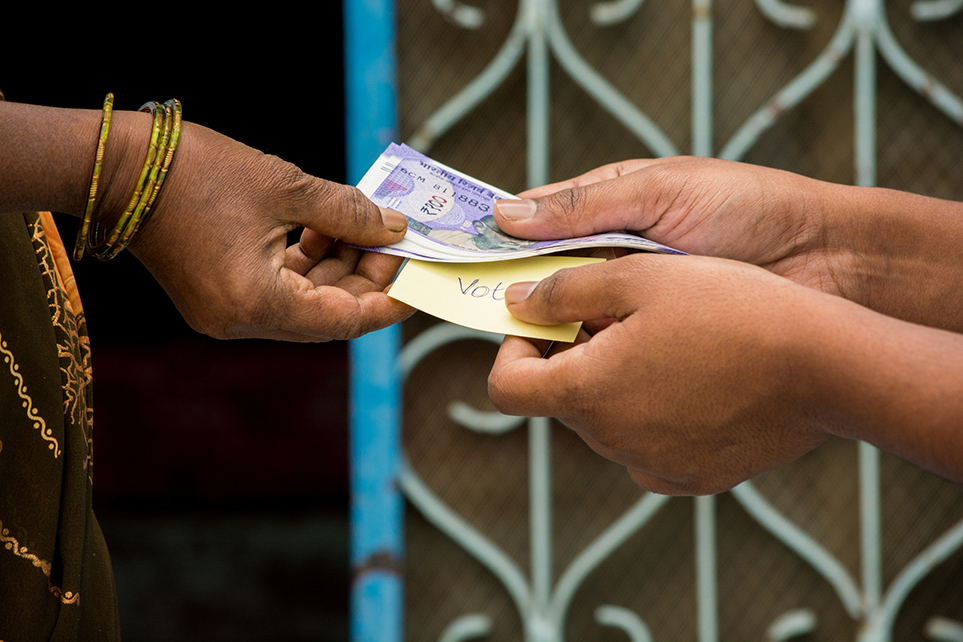
Bribery integral part of electioneering, reveals TDP MP; rival YSRCP mum

The distribution of cash to the voters is the worst kept secret of the Andhra elections. The quantum of cash may vary but all the major parties have perfected a well-oiled mechanism over years to deliver wads of currency at the doorsteps of the voters.
A senior MP from the ruling Telugu Desam Party (TDP), J C Diwakar Reddy, has now gone on record, bragging about bribing the voters.
A video showing the veteran leader from Anantapur district in the faction-ridden Rayalaseema region of Andhra Pradesh talking freely about the practice of distribution of cash to lure voters has gone viral on the social media.
Reddy, a septuagenarian lawmaker since 1985, has admitted that all parties put together had spent ₹10,000 crore to bribe voters in the April 11 simultaneous elections to the 175-member Assembly and 25 Lok Sabha sets.
The going rate was ₹2,500 for each voter, he says on camera. “This figure may go up to ₹5,000 in the next general elections,” he said.
His son JC Pavan Reddy contested from Anantapur Lok Sabha constituency on behalf of the ruling party while his brother J C Prabhakar Reddy’s son J C Asmith Reddy was the candidate from Tadipatri Assembly constituency.
“Tell me what to do? People openly ask for money when we go for the campaign. They confront us and demand ₹2500 each, saying that the rival party gave them ₹2000 each. At least, ₹50 crore has been spent by each party in each constituency. A total of ₹10,000 crore has been spent by all parties,” said the veteran leader who was with the Congress in the united Andhra Pradesh for over two decades before switching over to the TDP before the 2014 elections.
He had represented Tadipatri constituency in the Assembly and Anantapur seat in the Lok Sabha.
Reddy made another candid admission that the entire cash distributed to the voters by various parties “came from corruption.” “Everyone is to be blamed. Where is all this money coming from? It is money from corruption,” the TDP MP said.
Stunned silence
The damming revelation by the senior leader has evoked a deafening silence from his party. Neither the Chief Minister N Chandrababu Naidu nor any of his party colleagues have responded to Reddy’s remarks.
“What is there to react? Don’t you know the reality?” was how one senior TDP leader responded when The Federal reached out to him.
Ironically, one of the key campaign themes of the TDP was the alleged corrupt deals of the opposition YSR Congress Party president Y S Jagan Mohan Reddy and his stint in jail in connection with the illegal assets case.
Surprisingly, the YSRCP, which never leaves any opportunity to corner the government on corruption issues, has completely ignored the MP’s statement.
The Election Commission has set an expenditure limit of ₹70 lakh per LS constituency. However, the TDP MP claimed that each candidate, irrespective of the party affiliation, had spent ₹50 crore.
Cash flow
In the run up to the April 11 elections, the election authorities had seized ₹200 crore in cash, gold and liquor. Diwakar Reddy’s admission goes to show how much cash flow went unnoticed.
Another senior TDP leader and Speaker of AP Assembly Dr Kodela Sivaprasad Rao had admitted during an interview with a news channel in 2016 that he had spent ₹11.5 crore on his election from Satenapalli constituency in Guntur district in the 2014 elections. He had won that election by a wafer thin margin of 924 votes.
Cash distribution spreading to other states
“AP, Telangana, Tamil Nadu and Karnataka are the biggest spenders. But, this practice has spread to most states and is increasing. Even in Jammu and Kashmir and North-east, money is widely distributed. The trend is clear and growing all over India,” Dr N Jayaprakash Narayan, a former civil servant and founder of Lok Satta movement for electoral and democratic reforms, told The Federal.
He says that the election fight in AP finally boils down to competition between private money efficiently distributed to voters versus freebies with public money efficiently delivered. “Somebody has to win the polls but the people and soul of democracy have lost. We have a crisis here,” he said.
Electoral asymmetry
“Big money and willingness to spend large sums for vote buying have become major entry barriers. In such a scenario, the best citizens are marginalised, and it does not matter who wins among the big spenders. Plutocracy (rule of the rich) leads to kleptocracy (rule of thieves),” said Dr Narayan whose brief tryst with politics ended in 2014 when he lost from Malkajgiri Lok Sabha constituency.
Dr Narayan, who was a member of the National Advisory Council (NAC) between 2004 and 2006 and Administrative Reforms Commission in 2005, says that blaming parties or candidates or voters would not help.
“We need to change the electoral system to alter the incentives for parties and candidates. In our present First-Past-The-Post winner-takes-all model, the parties are trapped in a vicious cycle. We never built a system to enable the bulk of the people to understand the link between the vote and their lives. When there is no delivery with the vote, people are angry and the parties take advantage of poverty and offer money. The people accept it to maximise short term gain. It is a vicious cycle,” he said.
“Status quo is not an option. If vote buying, short term freebies without incomes and divisions become sure vote winners, we are in trouble as a society and economy. We must stem the rot,” Dr Narayan said.


